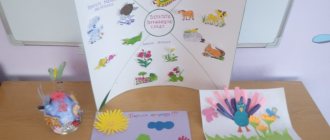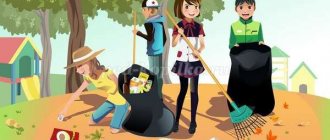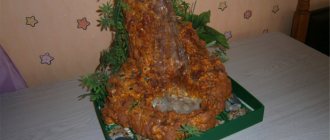Conversation “How to behave in nature”
Conversation on the topic “How to behave in nature”
Author: Irina Evgenievna Grigorieva, additional education teacher
MBU DO "Station of Young People" in the city of Vyazma, Smolensk region.
Purpose of the conversation
: consolidate knowledge about the rules of behavior in nature.
Equipment:
cards depicting situations in nature.
Progress of the conversation:
Guys, I would like to start our conversation with these words: “Nature is the common home of plants, animals and humans, and we need to think about how this house will always prosper and grow rich.” We often go to visit nature to admire its beauty, enjoy the fresh, fragrant air, hear birds singing, and pick wild berries, mushrooms, and nuts in a basket. But we must not forget that we are guests. We are in someone else's house, which has many of its own residents and rules. What are these rules?
The teacher reads a story on this topic.
Sunday trip to the forest
At the end of the school year in mid-May, the fourth graders decided to go to the forest. Early on Sunday morning they gathered at the bus stop along with Ivanov Kolya’s parents. We boarded the bus, bought tickets and headed off into nature with the breeze. They arrived in a good mood at the outskirts of the forest. And here the question arose before them, in which direction to move next. Maybe in that corner over there, behind which the white trunks of birch trees can be seen. It must be bright and cozy there! The decision is made, and the whole company quickly walks straight through forest grasses and low forest shrubs to the chosen place.
Did the fourth graders do it right? What did the children do wrong? What is their mistake?
Listen to one expression that may tell you the mistake you made. “One person leaves a trail in the forest, a hundred people leave a path, and a thousand people leave a desert.”
Now I hope it’s clear to you what mistake the guests made? The soil layer in the forest is very thin and can easily be damaged and compacted. And at the same time, damage the roots of trees and shrubs, which suffer greatly from such invasions.
What important rule of behavior in nature can be formulated based on the example discussed?
1.Do not trample forest clearings and corners in vain, move along the paths!
The place really turned out to be wonderful. Many forest flowers grew among the white-trunked birches. They were very beautiful, you just couldn’t take your eyes off them. And the guys decided to pick bouquets for their loved ones. While collecting flowers, they noisily told each other how happy their parents would be at such a beautiful gift.
(Questions are repeated). Did the fourth graders do it right? What did the children do wrong? What is their mistake?
There are fewer and fewer beautiful flowers left in our meadows and forests due to thoughtless picking: picked flowers quickly wither and die. Many of them have become rare and are listed in the Red Book. Therefore, try to admire them in nature rather than tear them and then throw them away in armfuls on the way home.
What important rule of behavior in nature can be formulated based on the example discussed?
2. Do not pick forest and wildflowers in huge armfuls!
Satisfied with the collected bouquets, the children cheered up and began to sing songs loudly. They decided to arrange a competition between teams to see who could sing the song loudest. At the same time, they did not forget about the tape recorder. The music thundered throughout the forest. Dasha decided to praise everyone: “What a great fellow we are! We organized a real holiday in the forest!”
(Questions are repeated). Did the fourth graders do it right? What did the children do wrong? What is their mistake?
Noise, loud music, screams in the forest scare birds, animals, and insects. Cubs can lose their parents and die without them.
If you want to see a lot of interesting things in nature and hear the singing of birds, the buzzing of insects, the squeaking of a wood mouse - hide and don’t make noise, listen to the rustles and sounds. You are visiting nature, remember this!
The following rule of conduct:
3. Don't make noise in nature! Move around and relax without noise!
After the fun concert, everyone decided to wander around the forest, look around, and watch the animals. And then tell us what interesting things you saw. This is what the girls later talked about. Not far behind the bushes they found a hedgehog. He got scared and curled up into a ball. The children thought that the baby was lost, so they needed to take him with them to the city. There he will get used to them and become tame.
(Questions are repeated). Did the fourth graders do it right? What did the children do wrong? What is their mistake?
In spring and early summer there are a lot of young animals in the forest: small fluffy squirrels, gray toy hares, small hedgehogs. All these animals are at home in the forest. So when you decide to take them, you are essentially stealing them. You steal them from your home. You know nothing about their habits, about the lifestyle they lead, about their food. You usually feed animals at home with food that is not the same as what they eat in the wild, and then you wonder why these animals, despite your care, suddenly die. It is enough to admire the animals in nature and bring with you a lot of impressions of meeting them that will not be forgotten for a long time!
The following rule of conduct:
4. Don’t take animals home from the forest!
The exception is injured animals that need assistance.
And on the way of the boys a huge anthill grew. Ants were scurrying around their house. They dragged needles, blades of grass, caterpillars, and insects into the anthill. Vova said: “Ants produce acid. Would you like to taste it? There were a lot of people interested. The boys broke branches from the bush and began to pierce the anthill with them. And then they licked the sour twigs with pleasure.
(Questions are repeated). Did the fourth graders do it right? What did the children do wrong? What is their mistake?
Ants play an important role in the life of nature. They destroy a huge number of forest pests. They need to be protected and protected in every possible way. After all, there are fewer and fewer anthills in the forests. Ants die from logging, they are ruined by irresponsible people who are ready to look at how these little insects scurry around. Healers catch ants to prepare formic alcohol. Anthills and forest animals are destroyed: bears, wild boars.
The following rule of conduct:
5. Never destroy anthills! Don't bother the ants in vain!
It's time for lunch. We decided to set up a bivouac under a large tree. The boys began collecting brushwood to make a fire. They didn’t forget about the spruce branches; they picked them to make it soft and comfortable to sit on. The girls began to lay out food supplies in the forest clearing. They unwrapped the sandwiches and threw paper into the pile. Empty cans and bottles were also sent there. Soon a bright fire began to blaze. The children enjoyed frying sausages and bread over the fire. And then they ate it all with gusto.
It's time to go home. The fire was put out. The children quickly got ready and headed towards the bus stop.
(Questions are repeated). Did the fourth graders do it right? What did the children do wrong? What is their mistake?
Look what's left after a vacation in nature. The area burned out from the fire gapes like a black clearing. The fire burned the roots and branches of a nearby tree. Nearby is a mountain of dried spruce branches. There are pieces of paper, tin cans, and pieces of bread lying on the grass. The grass all around was trampled, branches of nearby trees and bushes were broken.
The following rule of conduct:
6. Know how to organize your vacation so as not to harm nature!
Guys, what other rules of behavior in nature do you know?
7.When picking mushrooms, carefully cut them with a knife!
You cannot pull out or twist the mushrooms, so as not to damage the mycelium.
You should not knock down mushrooms that are unfamiliar to you; they can be useful to animals: squirrels, moose, deer, wild boars.
8.When picking berries, pick only ripe berries!
Many people rush to collect unripe pale pink lingonberries and cranberries, for which some pickers use scoops and scrapers that collect not only the berries, but sometimes the entire plant. Collect bouquets of strawberries and blueberries. The branches wither very quickly, but in nature new ones will not grow soon, only after several decades.
So we have discussed several commandments of behavior in nature. Of course, this is only a small part of the rules of behavior in the natural environment. But these rules will also help preserve natural diversity.
The reason for many negative actions in nature is ignorance. Therefore, your first task is to study the life of nature; find out why in nature it is necessary to act this way and not otherwise; try to follow the necessary instructions and prohibitions during rest, picking mushrooms and berries.



